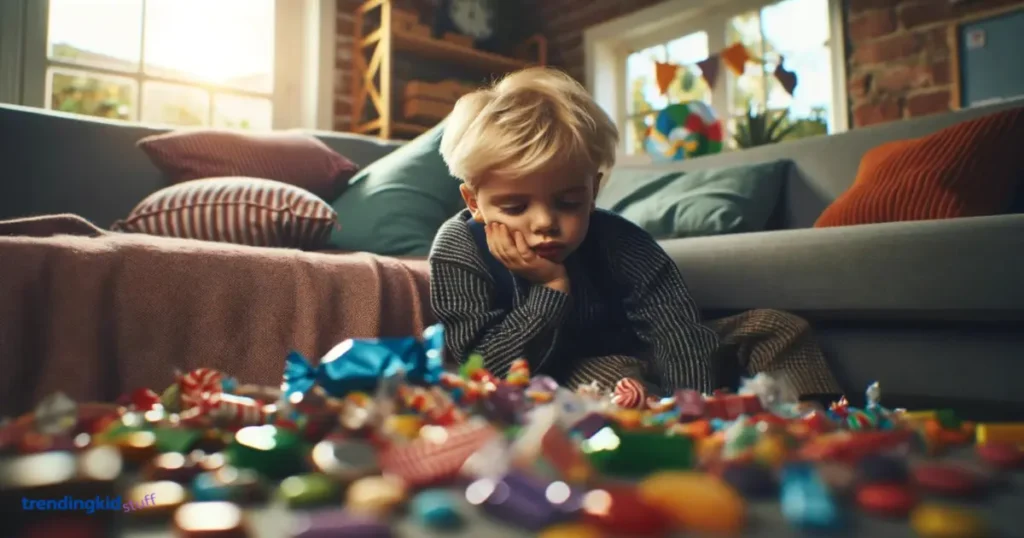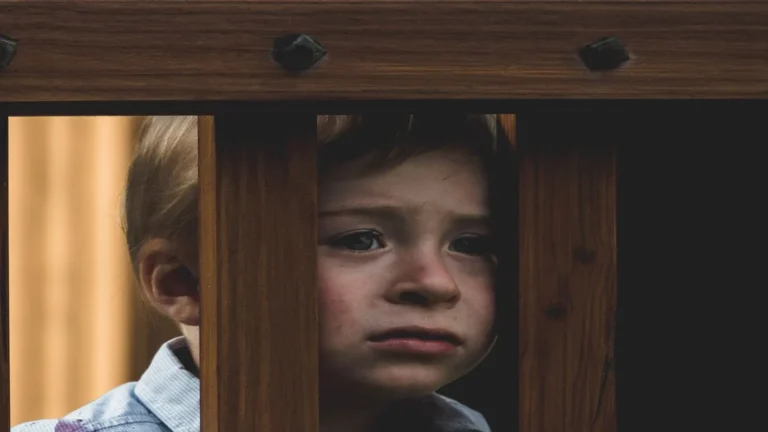The Best Way to Handle Your Child’s Sugar Rush

You know that moment all too well. Your kid scarfs down cookie after cookie at a birthday party. Before you know it, the “sugar rush” has kicked in and they’re bouncing off the walls and acting wild. Then 20 minutes later, they melt down into a sobbing mess.
If you’ve dealt with that, you’ve probably blamed sugar for their off-the-wall behavior. It makes sense, right? All those sweets must lead to them getting hyper, and then crashing hard. But is that really what’s happening? Does sugar transform your usually chill kid into a crazy energizer bunny?
Here’s the deal — there are good ways to handle your kid when sugar is around. You don’t have to ban birthday cake or run in fear of candy forever. With some smarts about what sugar does and doesn’t do, you can let your kid have the occasional sweet treat without losing your mind over their mood swings.
Read this to find out the real connection between sugar and hyperactivity. Get great ideas for keeping your kid from going haywire on Halloween or whenever candy appears. Learn how to keep their energy steady, even with some sweets now and then.
is sugar rush a real thing
Lots of parents blame sugar straight up for making their kids go wild. After pixie stix, cupcakes, and other sweets, the kiddos get hyped up and nutty, right? Not so fast. Scientific research hasn’t found a clear link between loading up on sugar and bouncing off-the-walls behavior in kids.
In one study, researchers had kids eat a ton of sugar one day, and then a sugar-free diet the next. Guess what? The sugar didn’t make them act hyper at all! Their behavior stayed the same whether they’d eaten a boatload of sweets or not.
So if science says sugar doesn’t cause hyperactivity directly, why do so many parents swear they see a difference after treats? There could be other things going on:
The bottom line is that while sugar may play a role in energy fluctuations, the claim that it straightforwardly causes hyperactive nuttiness appears untrue. Keep this in mind as we explore more around kids and sugar next!

What Happens If Kids Eat Too Much Sugar?
Even if sugar doesn’t cause hyperactivity directly, that doesn’t mean overflowing on sweets is no biggie. Consuming too much added sugar can affect kids in other ways, both in the short term and long run.
In the short term, here are some effects of the sugar rush in kids:
Over longer periods, too much sugar can have even more serious impacts:
As you can see, sugar doesn’t impact only short-term behavior. It’s critical to keep kids’ intake in check for their long-term well-being too!
How do you stop a sugar rush in a child?
Dealing with a sugar rush in a child can be quite a challenge, but there are several effective strategies you can try to help manage and reduce its effects.
Here’s a straightforward guide to help you out.
Drink Plenty of Water
One of the simplest and most effective ways to counter a sugar rush is by drinking plenty of water. Water helps dilute the sugar in the bloodstream, which can lessen the hyperactive effects. Encourage your child to sip water regularly, especially after consuming sweets.
Combine Sweets with Savory Foods
When your child indulges in sweets, try to pair them with savory foods. Foods rich in protein, healthy fats, and fiber can slow down the digestion of sugar, preventing rapid spikes and crashes in energy levels. For instance, if they’re having a piece of cake, serve it with some cheese or nuts. This not only balances their meal but also helps sustain their energy levels more evenly.
Add Probiotics to Their Diet
Probiotics are beneficial bacteria that support gut health. Introducing probiotic-rich foods like yogurt, kefir, or fermented vegetables can help balance the gut microbiota, which can be disrupted by high sugar intake. A healthy gut can mitigate some of the negative effects of sugar.
Encourage Physical Activity
After a sugary treat, encourage your child to engage in some physical activity. This could be as simple as playing outside, riding a bike, or even helping with household chores. Physical activity helps burn off excess energy and can prevent the crankiness that often follows a sugar rush.
Boost Their Immunity with Antioxidants
Excess sugar can weaken the immune system, so it’s important to include antioxidant-rich foods in your child’s diet. Fruits like berries, oranges, and kiwi, as well as vegetables like spinach and carrots, are excellent choices. These foods help support overall health and can counteract some of the negative impacts of sugar.
Teach Healthy Habits
Educate your child about the effects of sugar and encourage them to make healthier choices. Reading food labels together and understanding the impact of added sugars can help them develop better eating habits. Modeling balanced eating will also reinforce these habits.
Managing a sugar rush involves a combination of dietary adjustments, hydration, and physical activity. By integrating these strategies, you can help your child enjoy their sweets without the unwanted side effects.
The Best Approach for Handling Sugar
We’ve established that sugar doesn’t directly make kids hyperactive, but too much can still negatively impact their mood, energy, and health. So what’s the best approach for allowing some sweets while avoiding extremes?
First, know that completely banning all sugar seldom works. As one expert explains, “The long-term effect of sugar denial is likely an intense preference for sweets as soon as they can buy their groceries. What parents deny during childhood is exactly what their kids will seek out.
Instead, allowing some treats in moderation is key. But when sweets are served, balance and variety are also important. According to one pediatrician, “The best way to mitigate the effects of sugar is to mix either a complex carbohydrate, fat, or protein alongside the sugar. The sugar-related bursts and dips are barely perceptible because fat and protein take longer to digest and metabolize, giving you a steady energy source.”
A recent study calls into question the validity of the “sugar rush” altogether:
“The study involved 31 healthy adults who were given a drink containing either sugar or a placebo. The researchers found that there was no evidence of a “sugar rush” in the participants who consumed the sugary drink. The study’s authors hope that their findings will help to dispel the myth of the “sugar rush” and inform public health policies to decrease sugar consumption.”
So by allowing moderate treats, pairing them with more nutritious foods, and understanding sugar’s true effects, parents can help kids avoid major highs and lows. A balanced, realistic approach sets children up for better regulation in the long run too.
The Takeaway
The idea of kids having major behavioral reactions to sugar may be more myth than fact. Still, consuming too many sweets can negatively impact children’s energy, mood, and health, especially long-term. Banning all sugar rarely works well, but allowing kids to overindulge treats isn’t smart either.
The best approach? Allow moderate sweets paired with more nutritious foods. Fruit, protein, fiber, and healthy fats help balance out treats’ effects. Understand that some excitement around sugary foods is normal for kids without going overboard on restrictions that can backfire. Work treats into a routine diet, not as forbidden fruit.
Most importantly, focus on consistency, balance, and variety in what kids eat. Be realistic about occasions involving birthday cake or Halloween candy. Discuss healthy choices and limits ahead of time. With reasonable expectations and responses, kids can enjoy sweet moments without wild highs and lows. And over time, their ability to self-regulate sugar improves too.
The key is arming yourself with accurate information about sugar’s impacts. Then use a balanced approach for the best chance of avoiding the infamous crash … or “sugar rush!”





